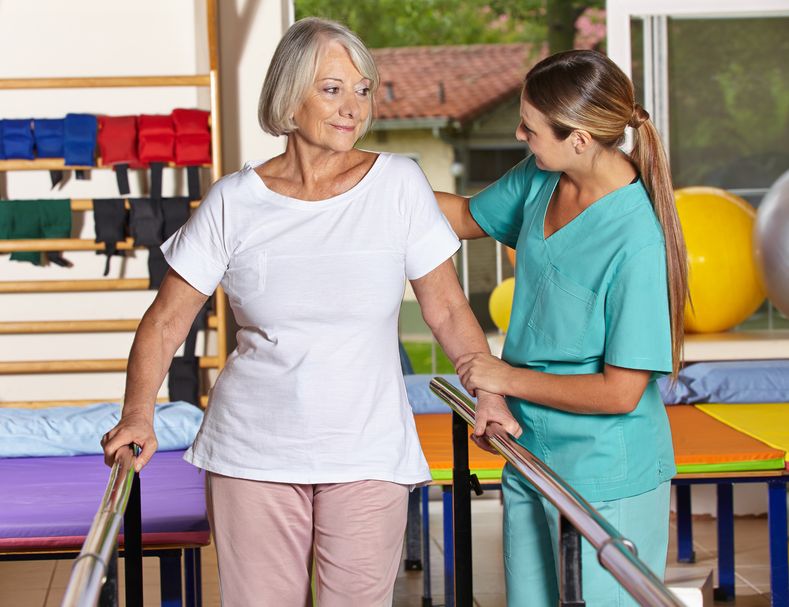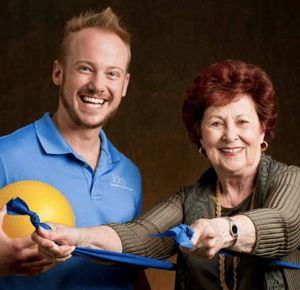
When elderly patients are discharged from the hospital following an injury, illness or surgery, they’re often faced with the decision of whether to recover in a short-term rehabilitation center, such as Marjorie P. Lee in Cincinnati’s Hyde Park neighborhood, or at home.
Wondering which is better for your clients? Read on for a closer look at the pros and cons of short-term rehab versus rehabilitating at home.
The Benefits of Short-Term Rehabilitation
Also known as post-acute rehab, short-term rehabilitation centers offer 24/7 skilled care and therapeutic services for residents. Typically lasting 21 days or less, short-term rehabilitation aims to address each individual’s unique needs in order to facilitate a functional and safe return to the home environment.
The inpatient nature of short-term rehab has several advantages, starting with access to comprehensive, continuous and customized physical, occupational, respiratory, speech, and cardiac rehabilitation services.
Short-term rehab not only ensures that patients receive all of the care and services they need, but also that they receive them in the most timely manner thanks to interdisciplinary teams of rehabilitation professionals with the training and expertise to accelerate the speed of recovery.
For example, according to the Mayo Clinic, people who participate in “focused stroke rehabilitation programs” recover better than those who do not. While many short-term rehab facilities will have the necessary resources and equipment, most patients won’t have access to these things at home.
Plus, because patients are on-site, there’s no need to travel to outpatient facilities, and therefore less risk of canceled appointments which can impede progress. There’s no better way to be sure that patients are steadily working toward their goals — without overdoing it — than with short-term rehabilitation.
“The ability to have therapy two times a day was wonderful and had a huge impact on my remarkable recovery — not only the frequency, but the ease of being onsite with my therapy team,” she says. “I never had to worry about my transportation to therapy appointments."
While some patients may express a preference for being home, high-quality short-term rehab centers are not only safer than many senior homes, but often comfortable. This is where finding the right short-term rehab center is important. Many offer a variety of amenities, including everything from private rooms and bathrooms to multiple dining options, adding up to a “home away from home” experience.
Factor in community activities and events, and short-term rehabilitation centers have the ability to uniquely support patients’ emotional needs as well as their physical ones. As senior loneliness is a major problem, the company of other seniors, as well as visits from friends and family, go a long way to supporting mental health in older adults.
Former rehab patient Barbara Gehrig credits the care she received at Marjorie P. Lee with making her healing progress much quicker.
“The ability to have therapy two times a day was wonderful and had a huge impact on my remarkable recovery — not only the frequency, but the ease of being onsite with my therapy team,” she says. “I never had to worry about my transportation to therapy appointments."
It is important to note, however, that all short-term rehab centers aren’t created equal. Referring clients to centers with state and national accreditations and a reputation for delivering exceptional care — such as Marjorie P. Lee — can ensure optimal outcomes. Asking the right questions can also help patients find the right short-term rehab facility.
The Benefits of At-Home Rehabilitation
At-home recovery is not without advantages of its own. At the top of the list for many patients? The desire to be at home. And it’s true: Many patients thrive in familiar settings.
However, it’s also important to note that the reality of recovering at home may be very different than what a patient envisions. In fact, without the proper support system in place, rehabilitating at home can be isolating, inconsistent and even dangerous.
For patients who cannot climb steps and/or access certain areas of their homes without assistance, meanwhile, at-home recovery may not be feasible. And while modifications, such as ramps and stairlifts, are possible, they can be costly.
Speaking of costs, money is another reason why at-home rehab may be a better fit for some patients. While traditional Medicare covers the first 20 days of a post-acute rehab stay, anything beyond that will incur a daily co-pay of $164 for the subsequent 80 days. Patients with private insurance plans and supplements, may have varying degrees of coverage.
Depending on the situation, it is possible that at-home recovery is a more financially prudent option — especially if a short-term rehab center doesn’t accept a patient’s insurance or if a stay will extend beyond 21 days. That said, making care decisions based entirely around money can be detrimental to a patient’s health and wellness.
Ultimately, what is right for one patient may not be right for another. Evaluating your client’s wants and needs alongside their specific circumstances can help you make the best recommendation for post-acute care.
At Marjorie P. Lee, we’re here to help you decide whether short-term rehab is best for your client. For more information, download our short-term rehab guide or contact us.












